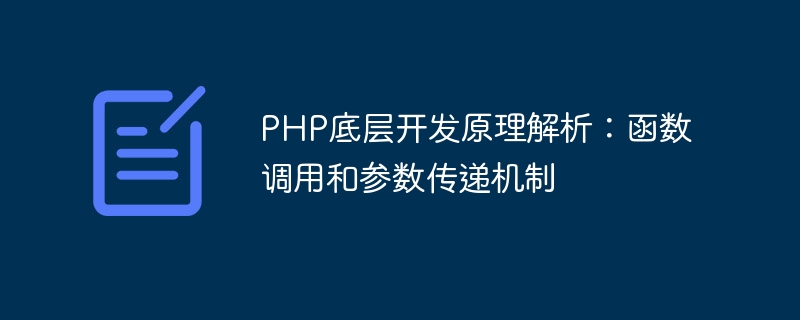

PHP is a widely used dynamic programming language, and its underlying development principles are crucial to understanding and improving the performance of PHP programs. This article will focus on analyzing the function calling and parameter passing mechanisms of PHP to help readers gain a deeper understanding of the underlying mechanism of PHP.
Function calling is a common operation in PHP programs, and its implementation involves a series of underlying principles. First, when the program executes to the location of the function call, the PHP interpreter will save the function call information in the internal function call stack. The function call stack is a stack structure used to save function call information, including function name, parameters, return address, etc. The function call stack is designed so that PHP can easily handle recursive function calls and correctly return to the context of the function call.
During the function call process, the PHP interpreter will find the corresponding function definition based on the name of the function, and transfer the execution right of the function to the corresponding function. In order to improve performance, PHP will cache when loading function definitions to avoid repeated function definition loading operations. Generally speaking, PHP caches function definitions in memory so that the cached function definition can be used directly the next time the function is called.
Parameter passing is an important part of function calling, which involves the passing of parameter values and the scope of parameter variables. In PHP, parameters can be passed in three ways: pass by value, pass by reference, and pass by default value.
Passing by value means copying the value of the parameter and passing it to the function. Modifications to parameters inside the function will not affect variables outside the function. The advantage of this method is that it is simple and safe, but it may consume more memory for parameters with large amounts of data.
Passing by reference means passing the reference of the parameter to the function. Modification of the parameters inside the function will affect the variables outside the function. This method can reduce memory consumption, but it should be noted that modifications within the function may affect other parts of the code. In PHP, use the & symbol to indicate passing by reference.
Passing by default value means that when the function parameter is not passed, the default value of the parameter is used. In PHP, we can use default parameter values to simplify function calls and improve program readability.
During the process of function calling and parameter passing, PHP will automatically perform type conversion to adapt to different data types. For example, when an argument of type integer is passed to a function that expects a string type, PHP automatically converts the integer to a string.
To summarize, PHP’s function calling and parameter passing mechanisms are important parts of PHP’s underlying development. Understanding these underlying principles can help us better understand how PHP works, and help us write efficient and maintainable PHP programs. I hope the content of this article can be helpful to readers.
The above is the detailed content of Analysis of PHP underlying development principles: function calling and parameter passing mechanism. For more information, please follow other related articles on the PHP Chinese website!




